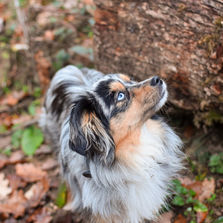
L'élevage d'en crenin
The breeders of Toy Australian shepherds d'en Crenin are located in the Charolais countryside in the heart of Burgundy. As professional breeders we have made the choice to raise dogs and puppies in an outdoor environment. Our dogs live with us and also spend a lot of time with other animals.
We selected our three foundation breeding dogs from the USA and Australia because we wanted them to be free from all genetic defects.
After months of research and contacting over 60 breeders throughout the world, with advice from our vet, we are very happy that we have selected the very best dogs to start our breeding program.
BREED DESCRIPTION
The Toy Australian Shepherd is still very rare in France, but has been the subject of serious breeding selection in the USA for over 30 years!
Here are the main characteristics of this dog breed, which actually originates not from Australia, but from the United States. The Australian Shepherd was originally a farm dog, working outdoors with livestock. Some traits of the original shepherd have remained in the Toy Australian Shepherd, such as intelligence, eagerness to learn, loyalty, and devotion to their owner. Toy Australian Shepherds are therefore very close to their owners. They are also known for their hardiness and liveliness, which can sometimes resemble that of a puppy. Toy Australian Shepherds typically live between 12 and 13 years. They also make excellent companions for children and get along well with other animals.
A Toy Australian Shepherd stands between 25.4 and 35.6 cm (10 to 14 inches) tall and weighs between 5.4 and 7.7 kg (12 to 17 pounds). They are smaller and lighter than Miniature or Standard Australian Shepherds, but larger and heavier than Teacup Australian Shepherds.
Our colours




red tri
RED MERLE
BLUE MERLE
Black tri
Breeding 100% free from genetic defects
To create the breeding of En Crenin, we selected dogs which are not carriers of genetic defects and in particular of the gene MDR1 so that their puppies are 100% free from it too.
The Australian shepherd toy is likely to have a genetic drug sensitivity, caused by a mutation in the MDR1 (multi Drug Resistance) gene. In dogs affected by this mutation, the administration of certain drugs such as antiparasitics, even in low doses, can therefore be neurotoxic and potentially lethal for the dog. Dogs carrying the MDR1 gene require more rigorous and costly veterinary monitoring.




















